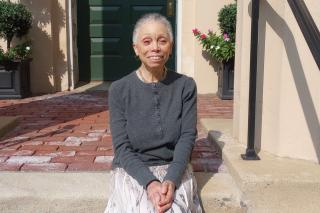In her new book, Public in Name Only: The 1939 Alexandria Sit-In Demonstration (University of Massachusetts Press), SLIS alumna Dr. Brenda Mitchell-Powell uncovers a little-known library demonstration which, she argues, was an important moment in civil rights history.
What is the story you tell in your new book?
The book recounts and contextualizes the motives and personal agency of Samuel Wilbert Tucker, a prescient, young, local Black attorney and activist, who endeavors, with the aid of five protesters, to desegregate the city's supposedly "public" library. The effort was not successful, but it anticipated the integration that began in 1959 and concluded in 1962 — 23 years after the sit-in!
What was the research process like? Did you visit any specific archival collections?
I found the research process fascinating, engaging, and inspiring. The story's numerous perspectives and nuances, in particular, were engrossing. It was difficult to cease conducting research, so I had to repeatedly remind myself to think "Enough already!" and move on.
I visited the Alexandria Black History Museum, Alexandria Library's Local History/Special Collections archives (the site of the bulk of my primary sources), Virginia Commonwealth University's archives, University of Virginia's Smalls archives, The Peoples' Archive (a division of the District of Columbia's Public Library), and the Library of Congress' NAACP collections.
What are some of your key findings?
The 1939 Alexandria Library protest was:
- Not the first sit-in but the first recorded direct-action sit-in protest for Black access to a public library.
- The first sit-in protest waged directly against the issue of segregation rather than for a fairer allocation of service provisions.
- Illustrates the potential of a sit-in to compel accommodation if not integration or desegregation.
- Anticipated the Black library-access protests of the 1940s, 50s, and 60s.
What impact do you envision the book will have?
My hope is that the book will:
- Provide evidence that the Civil Rights Movement did not begin in 1954.
- Provide evidence that the event has national as well as local significance.
- Introduce readers to an unsung civil rights leader and protest. Too often the same names and events are recounted. The worlds of people and events involved in Black civil rights protests deserves and needs to be expanded.
- Give evidence that libraries, which are sites of democracy as well as education and recreational reading, have been sites of civil rights protests not focused on schools.
Do you have any advice for scholars and students working on similar projects?
Collect oral histories from potential interviewees as early in the research process as possible after you have fully familiarized yourself with your story. Many of my interviewees were elderly and four of them died before the book was published, so they never saw the fruits of their contributions. Several potential interviewees had died long before my research had even begun, so only their historical knowledge and insights gleaned from others' research, if any, could be included.

